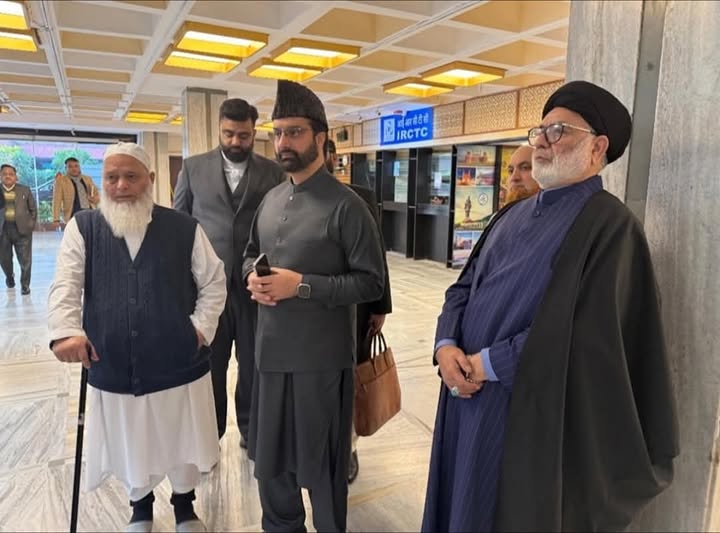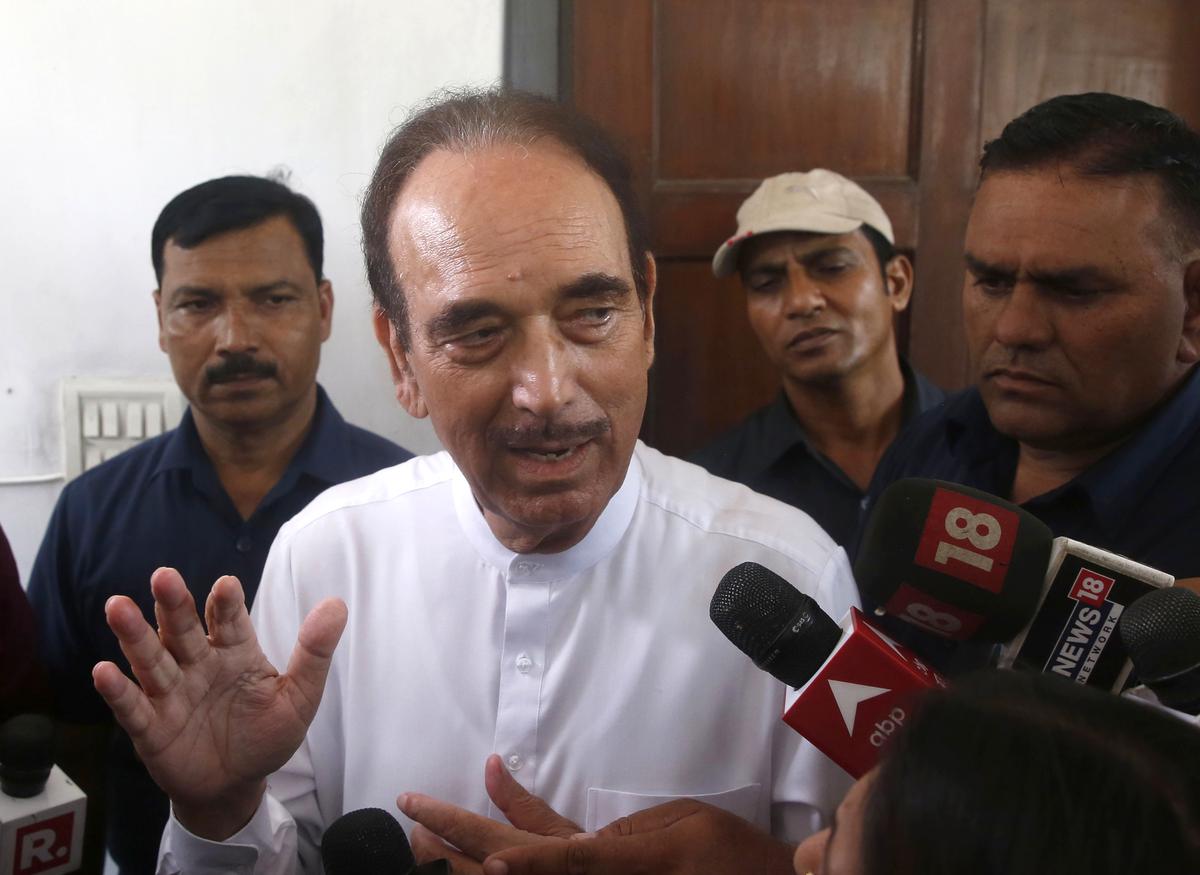A Pivotal Moment in Kashmir’s Political Landscape
By: Javid Amin
Srinagar 01 March 2025: For the first time since 2019, Jammu and Kashmir’s separatist leader Mirwaiz Umar Farooq has directly addressed a Parliamentary Committee on a legislative matter. This moment marks a potential shift in the region’s separatist politics and hints at a possible change in New Delhi’s approach toward moderate separatist leaders.
As Kashmir’s most influential cleric and a key separatist figure, Mirwaiz Umar Farooq has faced strict movement restrictions since the BJP-led government revoked Jammu and Kashmir’s special status under Article 370 in August 2019. His ability to attend Jamia Masjid in Srinagar for Friday sermons has been inconsistent, often requiring legal interventions for short travels. However, recent developments indicate a recalibration of strategy by both New Delhi and Kashmir’s separatist leadership.
On January 24, 2025, Farooq traveled to New Delhi, where he met members of the Kashmiri Pandit community, Muslim religious leaders, and Srinagar’s Member of Parliament, Aga Ruhullah Mehdi. However, the most significant moment of his visit was his appearance before the Joint Parliamentary Committee (JPC) led by BJP MP Jagdambika Pal, where he voiced concerns about the proposed Waqf (Amendment) Bill. While he attended as the patron of Mutahida Majlis-e-Ulema, an umbrella group of religious organizations in Jammu and Kashmir, his presence carried deeper political implications. This was the first direct engagement of a separatist leader with a Parliamentary committee, raising speculation about New Delhi’s evolving stance on Kashmir’s political future.
A Strategic Shift: Separatism to Pragmatism?
Farooq’s visit to New Delhi and his engagement in legislative matters suggest a notable shift in his political approach. Over the years, he has consistently been among the moderate voices in the All Parties Hurriyat Conference (APHC), advocating a peaceful resolution to the Kashmir issue. His willingness to engage in dialogue with the Indian government has often placed him at odds with the more hardline elements within Kashmir’s separatist movement.
A Kashmiri political observer, speaking on condition of anonymity, explained:
“The abrogation of Article 370 dramatically altered the region’s political landscape, leaving both mainstream and separatist forces significantly weakened. New Delhi’s policy has been one of containment rather than engagement. The fact that Farooq was allowed to travel and engage with policymakers could indicate a subtle shift in approach—from complete isolation to selective dialogue.”
Since 2019, the Hurriyat Conference has been largely inactive due to widespread arrests and political restrictions. New Delhi’s post-abrogation policy has effectively dismantled its influence, preventing it from mobilizing mass movements. Against this backdrop, Farooq’s visit raises key questions:
- Is the government willing to engage with moderate separatists while keeping hardliners at bay?
- Is Farooq attempting to remain politically relevant in Kashmir’s changing dynamics?
- Is this the beginning of a broader effort to integrate moderate separatists into mainstream politics?
The Reality of Political Engagement: What Lies Ahead?
Despite his engagements in Delhi, Mirwaiz Umar Farooq has remained cautious in his statements. His restraint suggests an awareness that the separatist movement has lost much of its appeal among ordinary Kashmiris. Since 2019, New Delhi has sought to normalize politics in Jammu and Kashmir, promoting elections and administrative reforms while maintaining a zero-tolerance policy towards separatism.
One of the most striking examples of changing political strategies is the Jamaat-e-Islami’s shift in approach. Previously known for its pro-boycott stance, the organization backed independent candidates in the 2024 elections. This move suggests that even hardline groups are recognizing the limitations of separatist politics and adapting to the new realities imposed by New Delhi.
Political analyst Rekha Choudhary believes this transformation is inevitable:
“The separatist movement in its traditional form no longer has space in Kashmir’s political arena. Even groups like Jamaat-e-Islami, which once opposed elections, are now adjusting to the new political landscape. Farooq’s engagement in Delhi is a continuation of this shift, as separatist leaders realize they must operate within the existing framework to remain relevant.”
Mirwaiz Umar Farooq: The Last Moderate Standing?
For decades, Hurriyat leaders distanced themselves from mainstream politics, viewing groups like the National Conference (NC) and People’s Democratic Party (PDP) as collaborators of the Indian state. However, Farooq’s recent meeting with NC MP Aga Ruhullah Mehdi signals a break from this tradition.
“Farooq’s engagement with elected leaders marks a notable shift from conventional separatist strategies,” said a senior journalist in Kashmir.
While it is unclear if this engagement will translate into a meaningful political alliance, it demonstrates that even separatist leaders must rethink their approach in the post-Article 370 era. With New Delhi steadfast in its policies and separatist groups weakened, leaders like Mirwaiz Umar Farooq are left with few options:
- Continue political isolation and risk irrelevance
- Engage in legal and constitutional matters to retain influence
- Slowly integrate into mainstream politics under the guise of religious leadership
One unnamed moderate politician from Kashmir suggested that Farooq’s move was inevitable:
“Both sides have realized that a perpetual face-off won’t yield results. Engagement is the only path forward. However, the dialogue must be genuine. Right now, it is entirely one-sided, with Delhi dictating the terms and not addressing our concerns.”
Delhi’s Long-Term Strategy: Containment or Engagement?
Despite Farooq’s recent engagements, New Delhi’s broader strategy remains one of control and suppression. Unlike past governments that explored dialogues with the Hurriyat (under Atal Bihari Vajpayee and Manmohan Singh), the Modi-led government has adopted a zero-tolerance approach to separatism. Key indicators of this policy include:
- Strict surveillance and curbs on Hurriyat activities
- Crackdowns on Jamaat-e-Islami and other Islamist organizations
- Detention of separatist leaders and restrictions on their movement
- Promotion of alternative political narratives within Kashmir
Political analyst Noor Ahmad Baba highlights an important distinction:
“Farooq’s engagement in social and religious issues does not mean a shift in Delhi’s broader policy. His limited freedom is tactical, not transformational. New Delhi is not looking for a compromise; it wants complete dominance over Kashmir’s political landscape.”
Conclusion: What Comes Next?
The question remains: Is Mirwaiz Umar Farooq engaging with Delhi out of political necessity or ideological evolution?
While his actions indicate an adaptation to new realities, it is unclear if this will lead to lasting political change. Delhi has yet to formally initiate a broad-based dialogue with separatists, and for now, Farooq’s outreach appears more symbolic than substantive.
As Kashmir navigates its post-Article 370 reality, the region’s political landscape remains fluid. Separatists have few options left, and as Delhi maintains its grip, the future of separatist politics in Kashmir remains uncertain.



